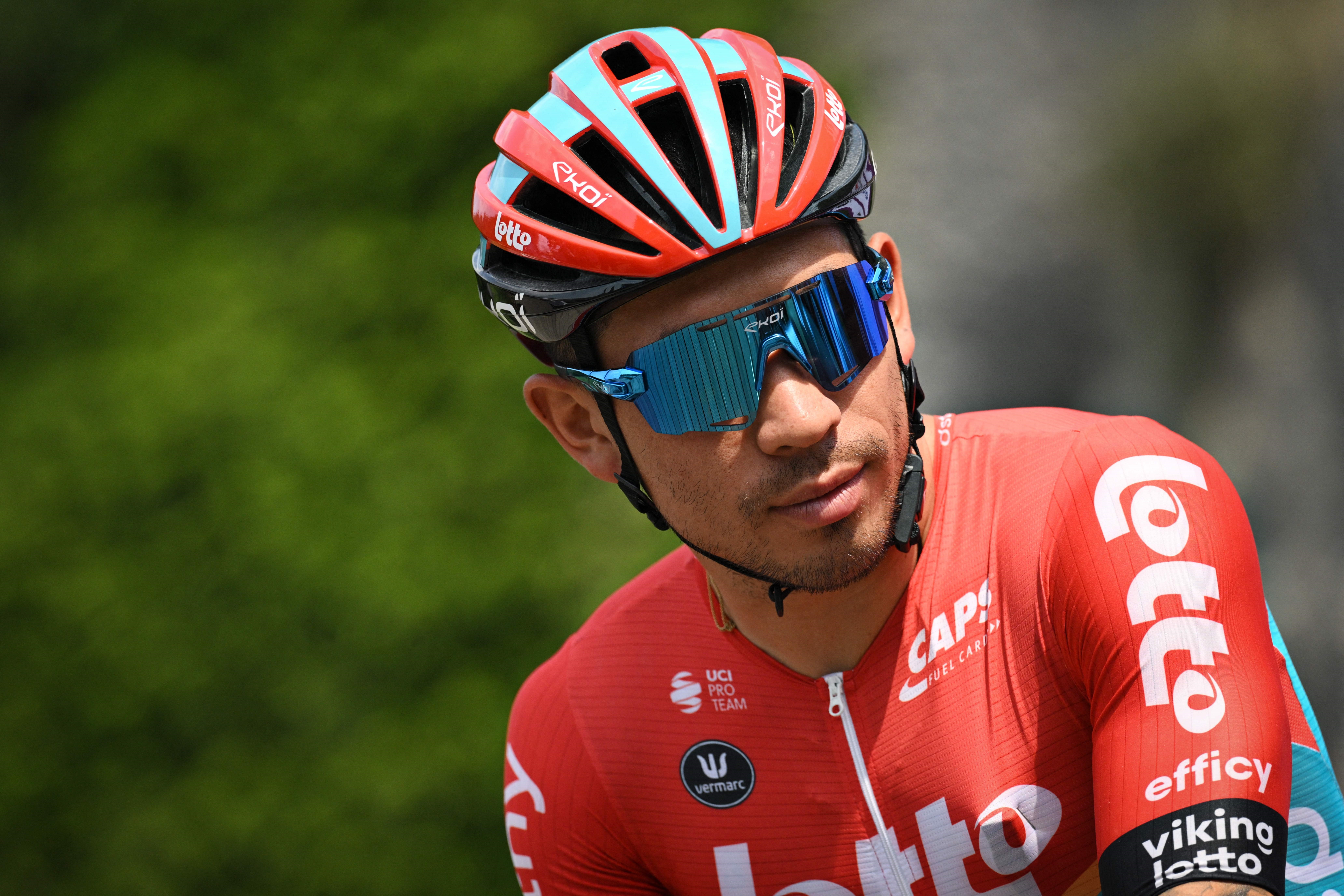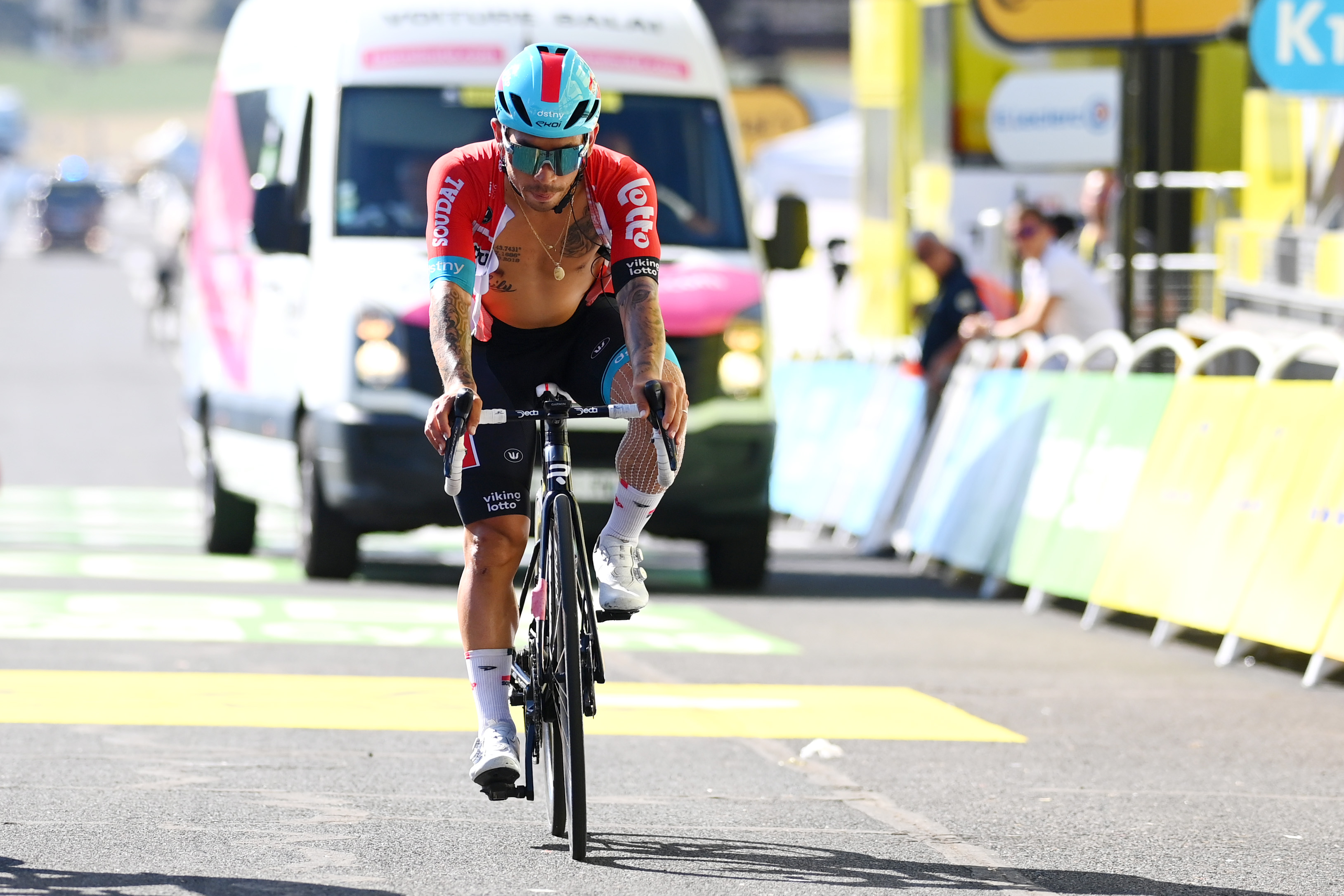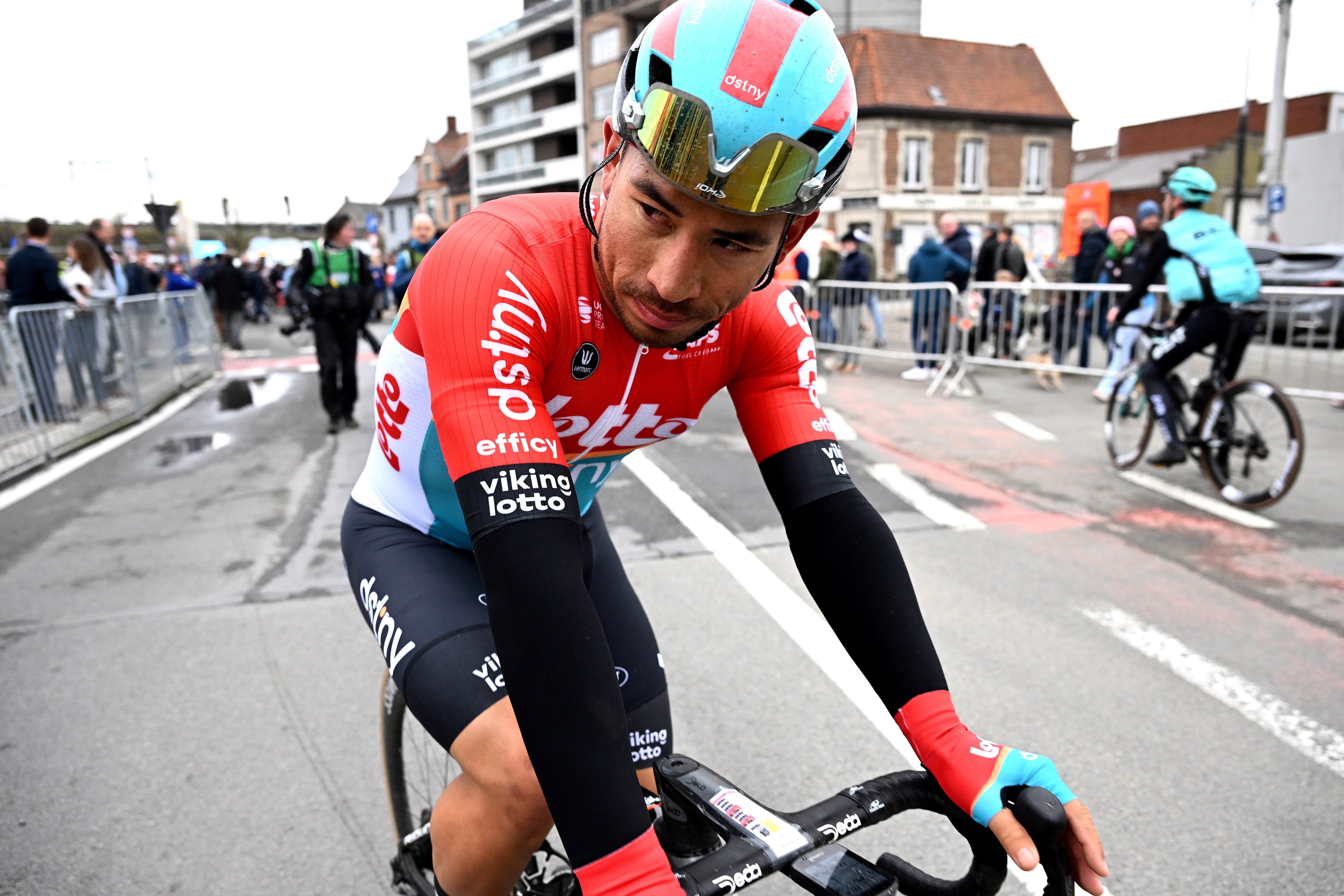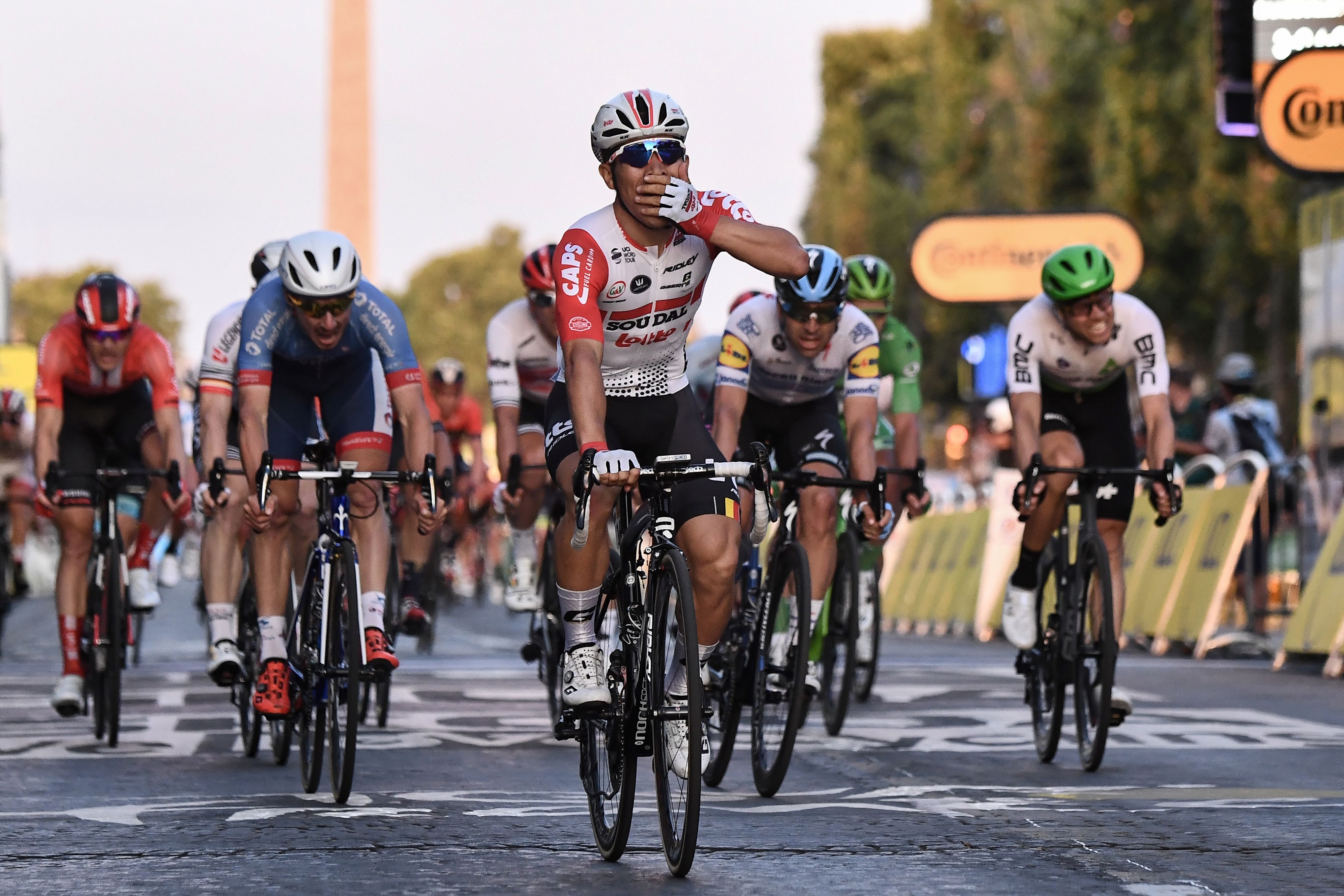‘My season is judged on wins, and only wins’ – Caleb Ewan's high stakes Tour de France
Australian looks to get back in winning habit after two ill-starred Julys

Nobody spent as long in the saddle last July as Caleb Ewan. The Australian rode into Paris as the lanterne rouge, covering the course almost six hours slower than overall winner Jonas Vingegaard. His career is built on speed, but his Tour de France quickly became an exercise in slow suffering on a route that provided little succour for sprinters.
“I think I didn't sprint for a win from when we left Denmark until we got to the Champs-Élysées,” Ewan tells Cyclingnews. “That’s a long time in between to be suffering through mountains and whatever to get there.”
When the Lotto-Dstny rider came in alone and last on the first real stage in the Alps, his days on the race already looked numbered. A heavy crash on the road to Saint-Étienne would complicate his Tour de France further, and he would dice with time cut jeopardy all the way through the Pyrenees.
Ewan would have been forgiven for climbing off his bike during any one of those lonesome slogs with the broom wagon rolling behind in vigil, but he persisted towards those far-off summits even knowing that sprint opportunities were rare and that his prospects of victory were slim.
Why do it?
“Probably because I know what it feels like to pull out of a race,” Ewan says. “As soon as you step off, as soon as you're sitting in the car or in the bus after your shower, as soon you're not suffering any more, the guilt sets in. And that feeling is way worse than the suffering that you have to do for the next few hours to get through a mountain stage.
“Even at races where it's planned that you’ll pull out, like I’ve done at the Giro in the past, you still have a shitty feeling afterwards. But at the Tour, there's no excuse. If you’ve stepped off, it's because maybe mentally just couldn't take it anymore.
The latest race content, interviews, features, reviews and expert buying guides, direct to your inbox!
“You go through hell, and there's always that voice in your head that's telling you to stop, because there's always that negative thought, the one that's always telling you to take the easy option, and you have to really tell that voice to shut up sometimes.”

Blotting out the noise is a useful skill for a man in Ewan’s position at the best of times, and even more so at a moment like this. The opening half of his 2023 season has, by his own admission, been “probably the worst” of his career to date. Although he started the year by claiming the Schwalbe Classic in Adelaide that is not an internationally ranked event so he had to wait until late May and the Van Merksteijn Fences Classic to notch up his first official victory of the campaign.
There had been plenty of near misses along the way, of course, most notably when he came out on the wrong side of a near dead heat with Tim Merlier at the UAE Tour and when he was, absurdly, denied GP Monseré victory by what looked to be a decidedly crooked finish line. Ewan knows, however, that a sprinter’s worth is weighed out in wins. The results sheet doesn’t include a column for mitigating factors.
“I think my season, and my career, is judged on wins, and only wins,” Ewan says. “So when I said it was the worst start, that was just based on the fact that it took me so long to win a race. I think my form was there, and I had a few close calls, but for whatever reason they just didn't go my way. Results-wise, it was the worst start to my career, but I'm motivated to make sure it's not the worst year of my career, and I think I'm able to turn it around.”
Climbers can pore over the data from their training rides and assuage most concerns by confirming that their watts per kilo are in line with expectations. A sprinter, on the other hand, can only truly gain reassurance by winning races. A long victory drought inevitability sees a sprinter begin to second-guess their own instincts, a cardinal sin in a business predicated on fleetness of thought as much as speed of legs.
“The thing is, the longer you go without the win, the more pressure is building on you, building on you, building on you,” Ewan says. “And when the win only comes in May, that’s a long time to wait. You don't race for the last three months of the year before, so it must have been well over six months before I had a win. It's a long time….
“A sprinter really needs that winning feeling to get the confidence. In a sprint, you almost want to be on autopilot. You don't want to be thinking about the decisions you're making. Because once you start having to think about the split-second decisions that you need to make, then the opportunity is already gone. You want everything to flow naturally, and that comes with winning.”
The Van Merksteijn Fences Classic was hardly a destination event, but it finally set Ewan on his way for 2023. “It would be different if I beat a guy that wasn’t one of the best, but to beat a guy like Merlier, it was like, ‘Alright, I'm back and beating really good guys again,’” says Ewan.
The intention – or perhaps the expectation – was to collect more wins in the build-up to the Tour, but Ewan had to settle for second places at the Volta Limburg after a late bike change and at Elfstedenronde Brugge after a high-calibre joust with Jasper Philipsen (Alpecin-Deceuninck). His Belgium Tour challenge, meanwhile, was hindered by a crash, though mercifully without lasting injury. On Wednesday, Lotto-Dstny confirmed that their Tour squad would be built largely around Ewan’s sprint, as it has been during his four previous years with the team.
“I was always around the mark, so it’s not like I thought, ‘I just don't have the legs to win anymore,’” Ewan says. “It was more: ‘It hasn't gone my way, but if I keep persisting, keep working hard, then it will click at some point.’
"But it's hard. It’s not that you doubt yourself, it's more the amount of pressure… You feel like everyone is just waiting: When's he gonna win next? When's he gonna win next? So to get a win [before the Tour] was a big relief.”

Ewan’s place at the centre of Lotto-Dstny’s Tour plans this season was never in any real doubt, of course, but, in the longer term, he is well aware that the squad’s ideas may begin to shift. Stéphane Heulot took over as CEO following their relegation from the WorldTour last season, while Kurt Van de Wouwer has stepped into the role of sports manager.
Above all, the development of Arnaud De Lie continues apace. The Belgian’s rapid turn of speed has carried him to thirteen wins since he turned professional last year, and his Omloop Het Nieuwsblad display demonstrated his aptitude on the cobbles.
His gifts are a double-edged sword for Ewan. On the one hand, the youngster’s haul of wins has helped to ease Ewan’s burden of being the team’s primary UCI points winner. On the other, De Lie’s emergence means that Ewan’s protected status, at the Tour above all, will not be a given in 2024, the final year of his existing contract.
“It adds pressure in a certain way and takes pressure off in another way,” Ewan says of De Lie. “If I'm not winning, then at least someone else is winning. When I first joined the team, it was kind of like, if I had a bad season, then the team had a bad season. I'd say my season last year wasn't particularly good. I didn’t have probably the quality of wins that the team wanted from me, and definitely not the quality that I wanted from myself, so it was good that the team had another guy they could rely on.
“But yeah, I know we’re in a Belgium team, so if we're neck and neck, I know who they're going to be choosing. I just have to make sure that I'm still performing well, and I think it's a good pressure to have. I think it keeps both of us on our toes. Both of us want to perform well."
This year, mind, the pressure at the team hasn’t come only in the form of healthy internal competition. In April, the CEO of sub-sponsor Dstny issued some sharp, public criticism of Ewan in an interview with Het Laatste Nieuws. “I expect a lot more from Ewan,” said Daan De Wever, who dialled up the pressure further by insisting Lotto-Dstny’s season will be a “shitty” one if they don’t secure a stage victory on the Tour, a responsibility that falls squarely on the Australian’s shoulders.
“Every sponsor wants to be seen at the Tour winning, it's obvious," Ewan said. "Does it need to be said in the media? Probably not. But external pressure is just a part of the Tour, and it’s still probably not as much as the pressure that you put on yourself anyway.”

Ewan had to wait until his fifth professional season to ride the Tour, but he immediately seemed to make up for lost time, rattling off a hat-trick of stage wins in his 2019 debut, including the finale on the Champs-Élysées, and then adding another brace during the pandemic-delayed edition of 2020.
The past two summers have been rather less fruitful. In 2021, Ewan’s Tour was ended by a heavy crash in the closing metres of stage 3. Twelve months ago, he contested only three bunch sprints, never placing higher than eighth. He wasn’t the only sprinter to struggle in a race that seemed almost engineered to prevent bunch finishes.
The 2023 route, at least on paper, looks more promising, but the prevailing trend at the Tour and elsewhere is to tailor finales towards puncheurs rather than sprinters. And while there may be, per Mark Cavendish’s reckoning, “seven or eight” possible bunch finales this July, the sprinters must begin by negotiating the hilly opening days in the Basque Country, while they must also traverse the Pyrenees in the first week.
“There's definitely more opportunities this year than last, which is good,” Ewan says. “But in general, I think now there are more stages suited to the guys like [Mathieu] Van der Poel, [Wout] Van Aert and [Julian] Alaphilippe. And in the years when Alaphilippe was more dominant, the Tour definitely wanted stages for him to do well in.
“They're probably more exciting to watch than a pure sprint. Pure sprint days are very, very exciting at the very end, but maybe they’re a bit boring before that. At the end of the day, the Tour is going to do what the Tour needs to do to gets eyes watching on the screen. And they will make the course accordingly, I think.”
Whether Ewan gets to sprint eight times or just once, the bottom line of his Tour remains the same. De Wever’s comment was unnecessary, but not necessarily wrong. A win in July makes Ewan’s Tour and season a success. Anything less, and it will be deemed a failure.
“I think you can have a good season without winning at the Tour, but I think you can also have a good season just by winning at the Tour,” Ewan says. “If I get a few wins at the Tour and nothing else, the season is still a success because my season’s all really based around the Tour.”
In this line of work, a few millimetres here, a snap decision there, can add up to a whole world of difference. The high stakes of the Tour aren’t for everyone, but for Ewan, they’re part of the appeal.
“No, I love it. I love it,” he says. “It's the only race that I dream about winning at. It's the only race that I can really get 100% motivated for. It’s had its tough moments for me too, but I guess that’s the great thing about sport. There are always hard times, but I'd love to turn my luck around this year. There's no better feeling than winning at the biggest race in the world, and I want to feel it again.”

Barry Ryan was Head of Features at Cyclingnews. He has covered professional cycling since 2010, reporting from the Tour de France, Giro d’Italia and events from Argentina to Japan. His writing has appeared in The Independent, Procycling and Cycling Plus. He is the author of The Ascent: Sean Kelly, Stephen Roche and the Rise of Irish Cycling’s Golden Generation, published by Gill Books.